Guest Blog by Rebecca Long and Danica Murphy, Juniors in Forensic Biology
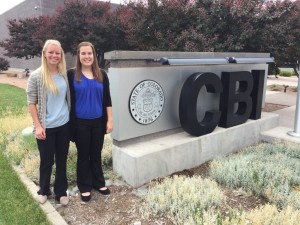 “This morning we are going to examine a homicide victim,” Dr. Kurtzman said. The victim had been dead four days; there was skin slippage, dried blood, a mutilated face, and forty-six stab wounds. This was the beginning of the second day of our internship. Yikes, how were we going to handle this? As forensic biology majors, we were encouraged to explore the different fields of forensics and we decided we both wanted to be forensic pathologists. This isn’t the type of profession that can be experienced through movies or textbooks. We needed to experience the sights, smells, and sounds of the dead. Much to our surprise, we both fell in love with the profession and this summer internship changed our lives in only six amazing weeks.
“This morning we are going to examine a homicide victim,” Dr. Kurtzman said. The victim had been dead four days; there was skin slippage, dried blood, a mutilated face, and forty-six stab wounds. This was the beginning of the second day of our internship. Yikes, how were we going to handle this? As forensic biology majors, we were encouraged to explore the different fields of forensics and we decided we both wanted to be forensic pathologists. This isn’t the type of profession that can be experienced through movies or textbooks. We needed to experience the sights, smells, and sounds of the dead. Much to our surprise, we both fell in love with the profession and this summer internship changed our lives in only six amazing weeks.
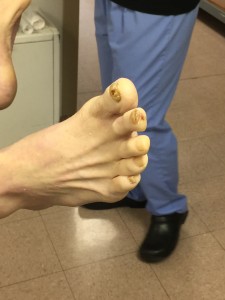 As an undergraduate student having the opportunity to work in a coroner’s office is unheard of. As we started to explore our options for an internship we experienced several email responses that were polite, but very disappointing. Most of the responses simply said, “Sorry, we cannot accommodate undergraduate students because we have contracts with medical schools. Best of luck!” We went to Security and Intelligence Studies professor Dr. Bozeman discouraged by the responses. Dr. Bozeman said he would try and contact some of his old colleagues and see what he could find. He is a retired homicide detective and mentor for the ERAU AISOCC (American Investigative Society of Cold Cases) student chapter. Within a few weeks Dr. Bozeman had secured an opportunity of a life-time for the two of us!
As an undergraduate student having the opportunity to work in a coroner’s office is unheard of. As we started to explore our options for an internship we experienced several email responses that were polite, but very disappointing. Most of the responses simply said, “Sorry, we cannot accommodate undergraduate students because we have contracts with medical schools. Best of luck!” We went to Security and Intelligence Studies professor Dr. Bozeman discouraged by the responses. Dr. Bozeman said he would try and contact some of his old colleagues and see what he could find. He is a retired homicide detective and mentor for the ERAU AISOCC (American Investigative Society of Cold Cases) student chapter. Within a few weeks Dr. Bozeman had secured an opportunity of a life-time for the two of us!
Over the summer, we worked under the direction of Dr. Kurtzman at the Grand Junction, CO coroner’s office. In the six weeks we were there, We observed twenty-one autopsies that included natural deaths, accidental deaths, suicides and homicides. Our patients ranged in age from babies to elderly. The sights, sounds, and smells were like nothing we could ever describe or forget. The smell of gases inside a decaying body is worse than any form of rotten meat or milk we have ever experienced. The sounds a body makes post mortem are eerie and disturbing, and the actual process of the autopsy is much more bloody and unsettling than anything they show you on the television shows.
Becca: I had worked as a volunteer in a hospital the summer before and during that experience I had the opportunity to observe a circumcision on a newborn baby. I had no idea what to expect and from the combination of the blood, the scalpel and the baby screaming it really bothered me and I passed out. Super embarrassing! However, with my autopsy experience I didn’t have any problems I’m happy to report. I was concerned about it, but the dead never cry, complain, or respond to pain which is what I found difficult with the baby during the procedure.
Danica: I had never seen a dead body before and was nervous for how I would react. The first body was the toughest because all I could think about was how a person was lying there which ate me up inside. I had to learn to treat each body as a case and look for the reason why they passed away. Finding the cause of death would help doctors find what the major contributing factors to death are in different communities as well as provide answers to grieving families.
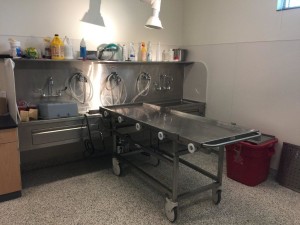 After the six weeks of working at the morgue and falling in love with the field of forensic pathology, we were thankful for the classes we had taken to prepare us for the internship. These courses included anatomy & physiology, microbiology, and forensic investigation and techniques. Without these courses we would have been lost and confused during our work. The doctor spoke in a language unique to the field of medicine and the concepts we discussed were specific to information I had learned in these classes.
After the six weeks of working at the morgue and falling in love with the field of forensic pathology, we were thankful for the classes we had taken to prepare us for the internship. These courses included anatomy & physiology, microbiology, and forensic investigation and techniques. Without these courses we would have been lost and confused during our work. The doctor spoke in a language unique to the field of medicine and the concepts we discussed were specific to information I had learned in these classes.
This internship provided us with so much more knowledge for the field of pathology and allowed us to find out if we were on the right career path. Dr. Kurtzman said on our first day with him that if he did his job correctly, we would both end up wanting to become forensic pathologists. After completing our internship, we can both agree he was right! We made so many memories in our short time in Grand Junction and we want everyone to be able to experience their dream career like we were able to do!



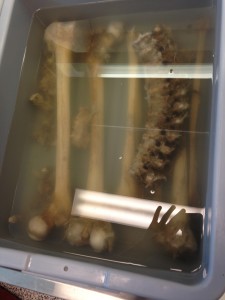
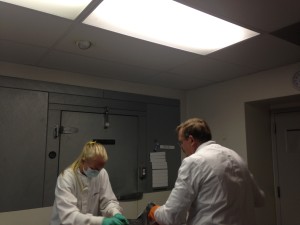
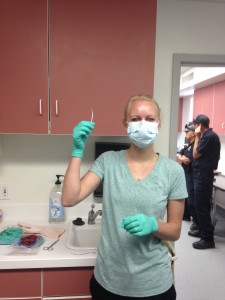
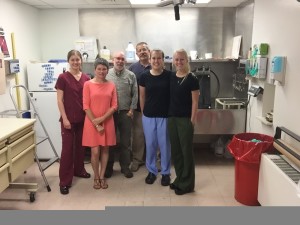
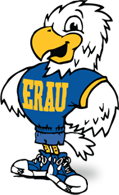
I have just come across this blog (a few years late to the party!) and I wanted to thank you as it is extremely informative and useful. I was wondering if you could advise me on the best way to apply for an internship in the same field or something similar?
Ellie–
Students at Embry-Riddle often gain access to exciting internship opportunities within their areas of interests, aided in large part by the industry contacts maintained by our experienced faculty. If you are curious about internship opportunities for Embry-Riddle students, you’re always welcome to contact our Prescott Campus Admissions Office for details on specific programs offered. Call us anytime, Mon-Fri from 8am to 5pm at 928-777-6600, or toll-free 800-888-3728. You can also email us at prescott@erau.edu.
Thanks Ellie– we look forward to hearing from you!